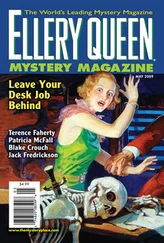Lisa Atkinson - Ellery Queen’s Mystery Magazine. Vol. 131, No. 5. Whole No. 801, May 2008
Здесь есть возможность читать онлайн «Lisa Atkinson - Ellery Queen’s Mystery Magazine. Vol. 131, No. 5. Whole No. 801, May 2008» весь текст электронной книги совершенно бесплатно (целиком полную версию без сокращений). В некоторых случаях можно слушать аудио, скачать через торрент в формате fb2 и присутствует краткое содержание. Город: New York, Год выпуска: 2008, ISBN: 2008, Издательство: Dell Magazines, Жанр: Детектив, на английском языке. Описание произведения, (предисловие) а так же отзывы посетителей доступны на портале библиотеки ЛибКат.
- Название:Ellery Queen’s Mystery Magazine. Vol. 131, No. 5. Whole No. 801, May 2008
- Автор:
- Издательство:Dell Magazines
- Жанр:
- Год:2008
- Город:New York
- ISBN:ISSN 0013-6328
- Рейтинг книги:5 / 5. Голосов: 1
-
Избранное:Добавить в избранное
- Отзывы:
-
Ваша оценка:
- 100
- 1
- 2
- 3
- 4
- 5
Ellery Queen’s Mystery Magazine. Vol. 131, No. 5. Whole No. 801, May 2008: краткое содержание, описание и аннотация
Предлагаем к чтению аннотацию, описание, краткое содержание или предисловие (зависит от того, что написал сам автор книги «Ellery Queen’s Mystery Magazine. Vol. 131, No. 5. Whole No. 801, May 2008»). Если вы не нашли необходимую информацию о книге — напишите в комментариях, мы постараемся отыскать её.
Ellery Queen’s Mystery Magazine. Vol. 131, No. 5. Whole No. 801, May 2008 — читать онлайн бесплатно полную книгу (весь текст) целиком
Ниже представлен текст книги, разбитый по страницам. Система сохранения места последней прочитанной страницы, позволяет с удобством читать онлайн бесплатно книгу «Ellery Queen’s Mystery Magazine. Vol. 131, No. 5. Whole No. 801, May 2008», без необходимости каждый раз заново искать на чём Вы остановились. Поставьте закладку, и сможете в любой момент перейти на страницу, на которой закончили чтение.
Интервал:
Закладка:
“What will you do now?” she asked. Her breath was coming fast.
“I don’t know,” I admitted. “If it was Rommel, in a sense he was a casualty of the African campaign. It was as if your brother had shot him dead. Deaths in battle are not considered murder — though sometimes I think they should be.”
Within a month Marcia O’Toole left the hospital and moved out of Northmont. I never saw her again. The death of Mr. Fuchs at Pilgrim Memorial Hospital attracted no attention at all. Accounts of Rommel’s death were published after the war, and all had him swallowing the cyanide capsule while in the car with his friend. If he made it all the way to Northmont with his capsule, no one ever admitted it.
© 2008 by Edward D. Hoch
Motive
by Hideo Yokoyama
After a dozen years as a newspaper reporter, Yokoyama Hideo began writing manga stories, children’s books, novels based on actual incidents, and mysteries. The following tale won the Mystery Writers of Japan award for best short story in 2000. Since then, several of Yokoyama’s wildly popular novels, including Half a Confession, Climbers High , and Sea Without Exit have been turned into film and TV productions.
Translated from the Japanese by Beth Cary.
1
It was after 10 a.m. when the wind came up.
There was none of the year-end bustle in the lobby of the prefectural hospital. There were no patients waiting for prescriptions, no visitors to cheer the sick, no nurses rushing by in a whirlwind. It was always like this here. In this hospital that overlooked the seacoast, where the windows were fitted with bars, even air and time were sequestered.
This is the last time I’ll be here this year, Kaise Masayuki thought as he filled in his personal information and the date on the visitors’ list: J Prefecture Police Headquarters, Police Affairs Department, Planning and Investigation Officer. Superintendent. Age 44.
And he had a mountain of work to complete before the end of the year in order to prepare for next spring’s administrative reforms.
Kaise’s footsteps echoed as he walked across the lobby and climbed the stairs. He showed his visitor’s card at the reception area in front of the locked ward. A muscled young male nurse unlocked the door and pushed open the barred security gate. Kaise continued down the hallway, thinking only of walking. Against the wall was one patient. Then another. Two people sat on the floor. Others stood around, squatted, or were doubled over. All of them wore vacant expressions.
His father was in the recreation room, where he sat cross-legged, unkempt, facing the wall. His eyes, half closed beneath the sleep caked in the corners, were fixed on one point of the tatami. His medicine was working. The medication had increased over the years, robbing his father, one by one, of words, facial expressions, and characteristic habits. Kaise hadn’t seen him for a month, but it might have been simply the drab color of his sweater that made his back seem so shrunken. He looked like a pile of dirt that could crumble away at any minute.
Kaise’s emotions nearly overwhelmed him.
“Old man, I’ve come to see you,” he said gruffly as he sat down beside his father.
He pulled out a bag of rice crackers, cut it open, and held it in front of his father’s expressionless face.
“You like these, don’t you?”
“...”
“You eating your meals all right?”
“...”
Kaise sighed. He hadn’t heard his father’s voice for several years.
His father had been held up as a model beat police officer. He had started as a messenger boy in the department during the chaotic postwar period. His diligence was rewarded, and he was promoted to policeman. Most of his forty years on the force had been spent in local or residential police boxes. Hard-working. Simple. Courteous. Wherever he went he was liked by the citizens he served. But after he reached mandatory retirement age, and his wife died, he began to fall apart.
Kaise gazed at his father’s wrinkled profile.
My old man fell in the line of duty.
He thought that he had noticed the first signs of his father’s illness before his mother died. As mandatory retirement drew near, his father became taciturn and often brooded all day long. Being a police officer was not merely an occupation for his father, it was his life. When he took off his uniform, his life had ceased.
“My goodness.” A nurse with a youthful face and a too-cheerful voice stared at Kaise.
“I’m Kaise. My father is always...”
“So it is you! I thought you looked alike.”
The nametag at her chest read, “Yagi Akane.” This was the young woman who had sent him a postcard saying she was the new nurse assigned to his father. “Please come visit occasionally.” She could have written just that. But she must have thought it sounded too pushy, and had included “I know you must be busy” three times in her gentle note.
“Please stay awhile!” She sounded overjoyed. She slid down onto the tatami on both knees and took his father’s hands, as white as wax, and shook them up and down. “Isn’t it wonderful that your son has come?”
Suddenly, his father uttered, “Yah.” Startled, Kaise looked at his father’s face.
“Yes, that’s right, you’re happy, aren’t you?”
He’s happy? Kaise was perplexed by Akane’s interpretation. He saw no change in his father’s face. Was he really happy?
“Nurse...”
Just when Kaise started to speak, his chest pocket vibrated.
“Crap. They catch me no matter where I am.”
Kaise grabbed his cell phone and turned his back on Akane, who was no longer smiling.
“I’m sorry to bother you on your day off,” a loud voice said into his ear. It was Subsection Chief Ioka from Headquarters, the Police Affairs Section. He was Kaise’s immediate subordinate. “We have a problem. The department chief asks that you come in right away...”
“What’s happened?”
“Well...” Ioka hesitated. “Sorry for the extra trouble, but please could you call back on a land line?”
Kaise felt uneasy. When he stood up, Akane looked as if she was about to cry.
“I’ll be right back,” he said to his father, and he left the recreation room. He was reluctant to use the telephone in the nurses’ station. He retraced his steps back along the hallway, had the male nurse unlock the door, and went to the public phone in the open ward.
He punched the buttons to dial the internal line of the chief of police affairs. Department Chief Kosuga answered immediately.
“It’s Kaise. What’s happened?”
Kosuga hesitated before he answered.
“The police ID notebooks are gone.”
“What?”
“Thirty of them. Thirty officers’ identification documents that were stored together for safekeeping have been stolen.”
Kaise stopped breathing.
“I’ve called a meeting of department heads. Get back to headquarters immediately and come directly to the conference room,” Kosuga ordered hurriedly. Before he hung up, he spat out the words, “Your idea seems to have backfired.”
Kaise froze.
The collective storage was hit...
They had implemented a new system aimed at preventing the loss of police IDs — the passport-like books police officers flashed to show they were part of the police force. Previously, police officers had been obliged to carry their IDs on duty as well as off. The recent revision of that regulation had allowed the head of each section to be entrusted with the safekeeping of subordinates’ IDs during off-duty hours. That meant that officers who were finished with their workday no longer carried their IDs home with them. When they left their offices, they entrusted them to their respective departments.
Читать дальшеИнтервал:
Закладка:
Похожие книги на «Ellery Queen’s Mystery Magazine. Vol. 131, No. 5. Whole No. 801, May 2008»
Представляем Вашему вниманию похожие книги на «Ellery Queen’s Mystery Magazine. Vol. 131, No. 5. Whole No. 801, May 2008» списком для выбора. Мы отобрали схожую по названию и смыслу литературу в надежде предоставить читателям больше вариантов отыскать новые, интересные, ещё непрочитанные произведения.
Обсуждение, отзывы о книге «Ellery Queen’s Mystery Magazine. Vol. 131, No. 5. Whole No. 801, May 2008» и просто собственные мнения читателей. Оставьте ваши комментарии, напишите, что Вы думаете о произведении, его смысле или главных героях. Укажите что конкретно понравилось, а что нет, и почему Вы так считаете.












